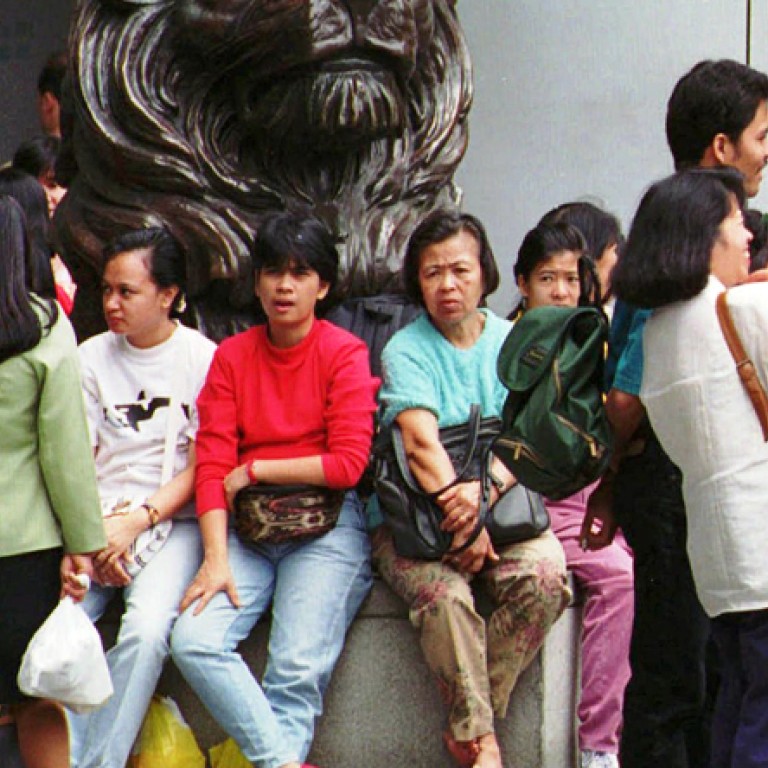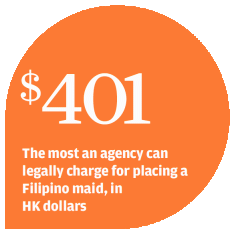
Thousands of Filipino maids forced to pay illegal fees
Record 8,000 helpers complain to consulate this year of agencies charging up to HK$20,000
A record 8,000 Filipino domestic helpers have sought help from their consulate in Hong Kong this year after employment agencies flouted local laws to demand placement fees from them, unionists say.

In August, the consulate issued a strongly worded memorandum to some 300 Philippine-accredited agencies in the city, warning that the offence would not be tolerated.
But a representative of the agencies said the practice was no longer common.
Eman Villanueva, spokesman for the Asian Migrants' Co-ordinating Body, said many helpers had to pay local agencies HK$20,000 if they wanted to work in the city. Some agencies forwarded part of the money to their Philippine partners, he said.
"About 8,000 helpers have reported the illegal collection to the consulate this year," Villanueva said. "Only 2,000 cases have been resolved. The consulate would arrange mediation between the agency and the worker, but it takes too long."
Under Hong Kong law, agencies can charge their job seekers 10 per cent of the first month's salary. As the monthly minimum wage for helpers now stands at HK$4,010, the agencies can seek a maximum of HK$401.
Manila bans the collection of any placement fee.
Many helpers could not afford the HK$20,000 fee and came under pressure from the agencies to borrow from banks or even loan sharks, Villanueva said. Some could not service the loan and turned to the consulate.
He said the loan sharks often continued to hound helpers on the phone in the course of mediation, forcing them to keep up their repayments.
In most of the resolved cases, the helper retrieved only HK$2,000 from the agency, Villanueva said.
In the past few years, about 1,000 helpers per year had approached the consulate for assistance. But the number had risen this year because the efforts of unions and word of mouth were raising awareness that the consulate could help, he added.
Helen Bulusan, chairwoman of the Filipino Migrants Association, said the actual number of victims of illegal collection was likely to be higher. Many maids did not report the problem to the consulate for fear of losing their jobs, she said.
Bulusan said some helpers took up illegal jobs on the side on Sundays, selling phone cards in Central and clothes in Sham Shui Po, to meet the agencies' demands and to send money home.
In August, Philippine labour attaché Manuel Roldan wrote a memorandum to all agencies in the city, saying that he had noticed two "irregular and illegal" practices.
One was helpers allegedly being taken to lenders for loans but not receiving any money.
They were issued a card and advised to pay the loan in instalments via 7-Eleven stores, Roldan said in the memo.
"The agency holds either the passport or the employment contract of the worker as collateral to ensure payment of these 'imaginary' loans," the memo said.
In the second practice, the helpers are assisted in opening a bank account but the agencies keep the ATM cards. Employers are then told to deposit the monthly wages of the helpers into that account.
These practices may lead to the suspension or cancellation of the agencies' accreditation with the consulate and the Philippine Overseas Employment Administration, the memo warned.
Teresa Liu Tsui-lan, vice-chairwoman of the General Chamber of Manpower Agencies, said such cases of illegal fee collection were common a few years ago.
"Very few agencies still do it now. No one wants to break the law," said Liu, whose chamber represents about 90 agencies.
She said some reports to the consulate of illegal fee charging involved cases that took place many years ago.

